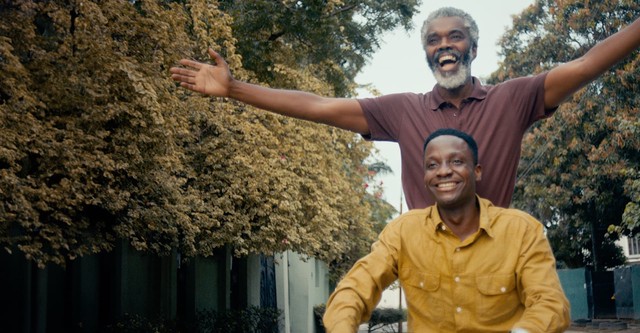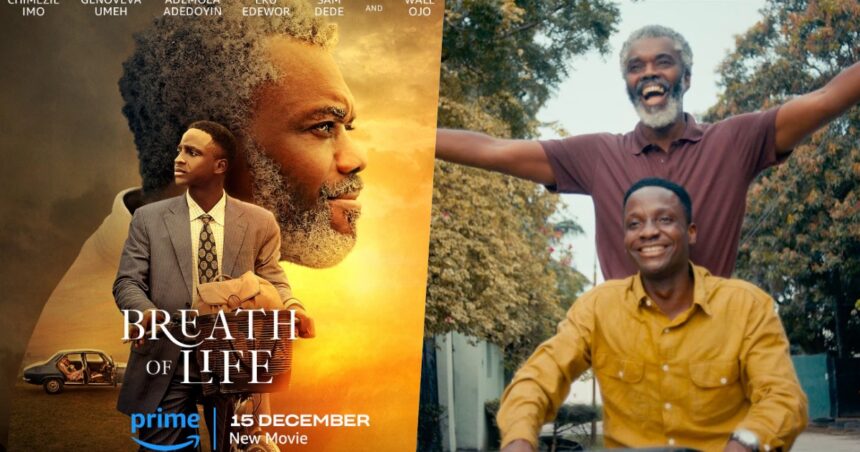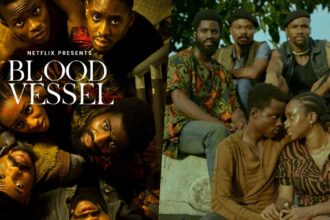I don’t gush about how good a Nollywood actor is or how criminally underrated an actor is, but ever since I first saw Ademola Adedoyin play Prince Aderopo, a serial killer in Kunle Afolayan’s “October 1st” (2014), even as a young boy of 18 at the time, I knew Ademola Adedoyin is a great thespian. However, the actor has since been miscast in roles that have hampered his career, or perhaps he simply made terrible choices. In Kemi Adetiba’s hit series “King of Boys,” he plays Kitan Salami, an easily forgotten pampered jealous child. He was miscast as Force 1 in Seyi Babatope’s “The Badboys and the Bridesmaids,” where he is part of a group of buddies who play an immature game of getting under the sheet with women and falling in love with them in the process.

So it was a relief to see him in “Breath of Life,” a period piece similar to “October 1st,” even though he only played the younger Timi Johnson for about twenty minutes. Perhaps Ademola Adedoyin excels in historical films where he is coiffed in a side part and outfitted in vintage shirts and pants from the era, giving him cinematic virility.
“Breath of Life” is a faith-based movie by Bodunrin Sasore who has also directed other faith-based movies such as “God Calling” (2018), “Before 30” (2015), and “Banana Island Ghost” (2017).
Timi (Ademola Adedoyin), who lived in Cambridge, England, in 1953, is introduced to us. Timi isn’t your average human being because he’s an extraordinary being with special gifts; he speaks 16 languages, four of which are extinct; for fun, he would rewrite holy books in different languages; he graduated at the top of his class, and was also the highest honored cadet in his entry class of Her Majesty’s Navy; he was also one of the youngest people to become a member of the clergy in the Great Church of England; he beat the Guinness Book of World Records for the longest time spent underwater, with a time of 57 minutes and 18 seconds, and only came out because he was bored. If you’re wondering why he didn’t just round it up to one hour, I understand. No need because our hero is unique.
Timi returned to Nigeria with his wife and child as a reverend in 1960, and he helped the community in repairing a small church. The community is terrorized by a gang led by Baby Fire (Chiedozie Nzeribe), a hoodlum with a toupée (maybe to illustrate the annihilation of identity that colonialism has on the African psyche) who murders a local political leader. So Timi goes to court as an eyewitness to the murder, only for Baby Fire to be released due to a lack of evidence, a trick pulled by Baby Fire’s association with some colonials, the people’s bidding that Baby Fire carried out because the political leader asks for the return of all colonizers, and thus the end of colonization. If you think this film is political, you’re mistaken. This is how far political the film goes. After he’s set free Baby Fire kills Timi’s family in a burning automobile, while Timi, who was held down by ropes by Baby-fire’s lackeys, watches helplessly as his family burns in the car. Timi lies down in one of the most dramatic and melancholy scenes, watching the entire unfortunate incident for 9 days as the sun rises and sets. Timi kills Baby Fire in vengeance; he then tries to kill himself in numerous ways, including putting the gun under his chin and gulping bleach, but our hero does not die.
When next we meet him, Timi (Wale Ojo) is a disgruntled, mean, and anti-god old man who has isolated himself from his community, and Elijah (Chimezie Imo), a god-fearing man and asthmatic patient applies for the job of house manager, responsible for cooking Timi’s breakfast of three eggs and a cup of coffee at 8 a.m. sharp. Elijah intends to raise sufficient funds to fully reopen the same local community church that Timi helped repair, which Elijah was already using for Bible studies one hour per week, during which Timi took his siesta. Our asthmatic patient, whose condition flares up whenever he feels nervous, is demonstrated in a humorous scene when he finally meets Anna (Genoveva Umeh), a nurse at a nearby clinic, whom he has been crushing on since the day he first met. Soon after, the two lovebirds begin spending a lot of time together, cruising about the community on bicycles. Timi and Elijah’s bond strengthens over time as well. Timi teaches Elijah how to drive in one of the funnier scenes, as he abuses Elijah in different languages out of irritation; and Elijah reads him his newspapers every morning. The restoration of Timi’s film memories of his family further brings the pair closer to one another, even driving together on a bicycle.
Anna arranges for Elijah and her parents to meet. However, when Anna’s parents learn that Elijah is the one who wants to reopen the long-forgotten local church and has been fighting and attempting to derail the hotel, Elijah is required to pay Chief Okonkwo (Sam Dede) 49 million naira within 90 days. So Elijah and Anna try to raise the funds on their own after Timi refuses to assist. Elijah and Anna’s relationship suffers as Anna’s reputation as an ‘understanding girlfriend’ is called into doubt. But, with divine providence, he can salvage both his church and his love with Anna.
Of course, the films have flaws; there is a lack of prominent female characters that are largely passive and stagnant. Tina Mba, one of the team’s most prominent female actors, is brutally sidelined in the role of an obnoxious character, Iya Ayo, who is usually chewing on chewing gum and is a member of Elijah’s Bible study group. This ‘trope-y’ and clichéd figure is so prevalent that you wouldn’t be far off if you said she’s the owner of a local pub selling local gins. Tina Mba, as usual, manages to perform despite the limited screen time provided to her.
Timi’s relationship with Elijah is paternalistic and mechanical, rather than productive. The parent-child relationship, when Elijah refers to Timi as his father and Timi refers to him as his son, is almost deus-ex machina, as we’re completely thrown off because, yes, they started bonding together, but nothing in that suggested a father-child relationship, which is something religious people in Nigeria would do, despite Timi being mostly trained in Britain. In that regard, we know Elijah is a new graduate who left Lagos looking for work, but we don’t know anything about his family, whether he regards Timi as a father figure because he is an orphan, or whether he has a poor relationship with his family.
“Breath of Life” is a magnificent film with visually stunning cinematography. The cinematographer, Ola Cardoso, and director, Bodurin Sasore, distinguish the film with its brilliant hued color palette, which makes the film lovely and aesthetically enjoyable to watch with flamboyant but not overwhelming artistic choices. The film also shows the evolution of not only Afrobeat music but also its music videos, with Ola Cardoso providing an almost voyeuristic visual that recalls Ghanaian director Blitz Bazawule’s impressionistic and artistic “The Burial of Kojo” (2018). Ola Cardoso’s decision isn’t even close to that, but it’s still lovely. The choice of cinematography is not arbitrary, as it adds a striking tone to the characters’ dark skin.
The intimate, passionate, and devastating depiction of the agony of family loss and the bonding process—the way to redemption after faith loss, combined with the cinematic achievement make “Breath of Life,” despite its imperfections, refreshing and delightful to watch.
Rating: 6.7/10
















